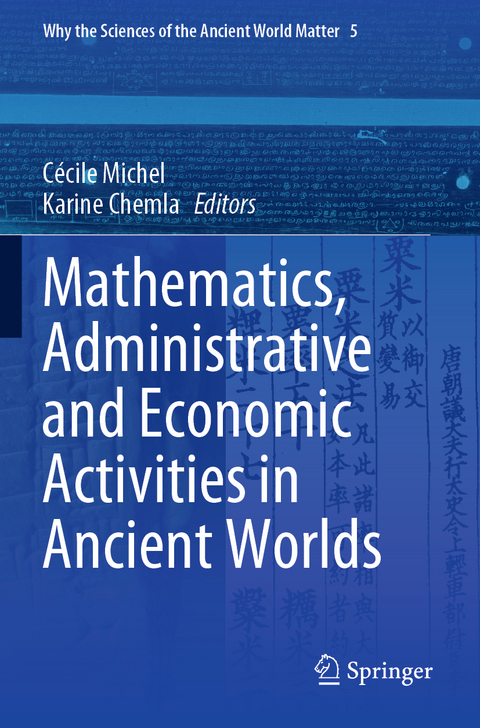
Mathematics, Administrative and Economic Activities in Ancient Worlds
Springer International Publishing (Verlag)
978-3-030-48391-3 (ISBN)
Cecile Michel is a Senior Researcher at the laboratory ArScAn, at the French National Center for Scientific Research (CNRS), (CNRS, Universite Paris 1 Pantheon-Sorbonne, Universite Paris Nanterre, Ministere de la Culture) and a Professor at Hamburg University. An Assyriologist, she works on Assyrian and Babylonian cuneiform texts from the 2nd millenium BC and conducts research on social and economic history, gender studies, material culture, education, mathematics and literacy. She is a member of the international team in charge of the decipherment of the private archives of Assyrian merchants excavated in central Anatolia. Her publications include Correspondance des marchands de Kanis au debut du IIe millenaire av. J.-C. (Le Cerf, 2001), Women in Assur and Kanes from the private archives of Assyrian merchants of the early 2nd millennium BC (SBL, in press), Richesse et societes (ed. with C. Baroin, De Boccard 2013), Wool Economy in the Ancient Near East and the Aegean: from the Beginnings of Sheep Husbandry to Institutional Textile Industry (ed. with C. Breniquet, Oxbow Books 2014), and The Role of Women in Work and Society in the Ancient Near East (ed. with B. Lion, Walter de Gruyter 2016). Karine Chemla is a Senior Researcher at the French National Center for Scientific Research (CNRS), laboratory SPHERE (CNRS & Universite de Paris. Her research focuses the historical anthropological aspects of the relationship between mathematics and the various cultures in the context of which it is practiced. Chemla published Les Neuf Chapitres (with Guo Shuchun, Dunod, 2004), and edited The History of Mathematical Proof in Ancient Traditions (Cambridge University Press, 2012); Texts, Textual Acts and the History of Science (with J. Virbel, Springer, 2015); The Oxford Handbook of Generality in Mathematics and the Sciences (with R. Chorlay and D. Rabouin, Oxford University Press, 2016); Numerical Tables and Tabular Layouts in Chinese Scholarly Documents (Special issues of East Asian Science, Technology and Medicine, 43 (2016, March 2017) & 44 (2016, April 2017)); and Cultures without culturalism: The making of scientific knowledge (with Evelyn Fox Keller, Duke University Press, 2017). Chemla is a member of the Deutsche Akademie der Naturforscher Leopoldina (2005), of the Academia Europaea (2013), and of the American Philosophical Society (2019).
Chapter 1. Mathematics, Administrative and Economic Activities in the Ancient Worlds: An introduction (Cécile Michel and Karine Chemla).- Chapter 2. A Comparative Study of Prices and Wages in Royal Inscriptions, Administrative Texts and Mathematical Texts in the Old Babylonian Kingdom of Larsa (Cécile Michel, with contributions by Robert Middeke-Conlin and Christine Proust).- Chapter 3. Computation in the Arthasastra (Mark McClish).- Chapter 4. Official Salaries and State Taxes as Seen in Qin-Han Manuscripts, with a Focus on Mathematical Texts (Peng Hao).- Chapter 5. Insights into the Administration of Ancient Irrigation Systems in Third Millennium BCE Mesopotamia (Stephanie Rost).- Chapter 6. Mathematical Computations in the Management of Public Construction Work in Mesopotamia (End of the Third and Beginning of the Second Millennium BCE) (Martin Sauvage).- Chapter 7. The use of volume in the measurement of grain in early imperial China (Karine Chemla and Ma Biao).- Chapter 8. TheMeasurement of Fields During the Pre-Sargonic Period (Camille Lecompte).- Chapter 9. Early-Dynastic Tables from Southern Mesopotamia, or the Multiple Facets of the Quantification of Surfaces (Christine Proust).- Chapter 10. Computation Practices of the Assyrian Merchants during the Nineteenth Century BCE (Cécile Michel).- Chapter 11. Connecting a Disconnect. Can Evidence for a Scribal Education be Found in a Professional Setting During the Old Babylonian Period? (Robert Middeke-Conlin).- Chapter 12. Loans and Interest in Sanskrit Legal and Mathematical Texts (Sreeramula Rajeswara Sarma and Takanori Kusuba).- Chapter 13. Computational Practices Around Coins and Coinage: John of Murs' Quadripartitum Numerorum and French Money Changers' Books (Marc Bompaire and Matthieu Husson).
"Mathematics, Administrative and Economic Activities in Ancient Worlds fills a longstanding need to situate mathematics into its context of administration in which it originated and developed in various societies. ... These publications attest to the lively and active community of historians of science working on ancient sources and the potential to learn about the origin and early development of sciences ... within societies which-judging by recent developments-has become a point of concern in many parts of the world." (Annette Imhausen, NTM, Vol. 30 (3), September, 2022)
"As an economist, I thoroughly enjoyed and was impressed at the many details and analysis of those examples of these activities in the varied places during these early time periods. ... The is book is very comprehensive in its discussion. Math formulas explaining different ways of computing interest and many other types of financial economic analysis are given. Each chapter has an ample number of references." (Paul Gentle, HEI History of Economic Ideas, Vol. 29 (2), 2021)
| Erscheinungsdatum | 02.10.2021 |
|---|---|
| Reihe/Serie | Why the Sciences of the Ancient World Matter |
| Zusatzinfo | VI, 568 p. 162 illus., 35 illus. in color. |
| Verlagsort | Cham |
| Sprache | englisch |
| Maße | 155 x 235 mm |
| Gewicht | 872 g |
| Themenwelt | Geschichte ► Teilgebiete der Geschichte ► Wirtschaftsgeschichte |
| Mathematik / Informatik ► Mathematik ► Allgemeines / Lexika | |
| Mathematik / Informatik ► Mathematik ► Geschichte der Mathematik | |
| Naturwissenschaften | |
| Schlagworte | Ancient Administration • Ancient Irrigation Systems • ancient mathematics • Arthasastra • Arthaśāstra • Economic History • Old Babylonian Kingdom of Larsa • Qin-Han Taxes • Quadripartitum Numerorum |
| ISBN-10 | 3-030-48391-6 / 3030483916 |
| ISBN-13 | 978-3-030-48391-3 / 9783030483913 |
| Zustand | Neuware |
| Haben Sie eine Frage zum Produkt? |
aus dem Bereich


